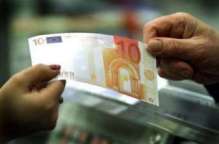Going up ...
 This is of course pretty much as expected and given the recent figures of services in the Eurozone which came out earlier this week Trichet might feel just a bit relieved. Not to speak about the recent flurry about demands in Germany for higher wages.
This is of course pretty much as expected and given the recent figures of services in the Eurozone which came out earlier this week Trichet might feel just a bit relieved. Not to speak about the recent flurry about demands in Germany for higher wages.
'At today’s meeting the Governing Council of the ECB took the following monetary policy decisions:
The minimum bid rate on the main refinancing operations of the Eurosystem will be increased by 25 basis points to 3.50%, starting from the operation to be settled on 13 December 2006.
The interest rate on the marginal lending facility will be increased by 25 basis points to 4.50%, with effect from 13 December 2006
The interest rate on the deposit facility will be increased by 25 basis points to 2.50%, with effect from 13 December 2006.'
I will properly have more to say about this at some point but since I am working hard with the exams at the moment I will just leave you with the small yet important point as I believe that what is going on here at the ECB is what is really driving the dollar down at moment (i.e. expectations on interest differentials) and not some underlying tide which will continue and re-balance the imbalances. After all, there is a ceiling for how far the ECB can go here and we might sooner or later find out where that is.
Some additional commentaries on the raise ...
The ECB press conference ... (Trichet)
At today’s meeting, we decided to increase the key ECB interest rates by 25 basis points. This decision reflects the upside risks to price stability over the medium term that we have identified through both our economic and monetary analyses.
(...)
Turning first to the economic analysis, according to Eurostat’s first estimate, the quarter-on-quarter growth rate of real GDP in the euro area for the third quarter of 2006 was 0.5%. The data thus confirm our assessment that economic activity continued to expand robustly, while moderating from the very strong rates seen in the first half of the year. Domestic demand remained the main driver of economic growth in the third quarter, confirming the anticipated broadening of the recovery and pointing to the increasingly self-sustaining nature of economic expansion in the euro area.
The ECB’s press conference was watched carefully for any changes in the language used by Mr Trichet to signal the central bank’s medium term thinking. Over the past year, the central bank has developed a “traffic light” system of signalling rate rises ahead. Two or three months ahead of a rise it would typically pledge to “monitor closely” or “monitor very closely” inflation developments, switching to “strong vigilance” a month ahead of an increase.
But financial markets expect that the pace at which the ECB is increasing interest rates will slowdown next year – and some think the ECB might even pause. That may persuade Mr Trichet to start overhauling the language he uses. At least some members of the ECB’s governing council are likely to have argued for creating more room for manoeuvre in 2007.
``Our monetary policy continues to be accommodative,'' Trichet, 63, said at a press conference in Frankfurt. The bank today raised its main lending rate by a quarter-point to 3.5 percent. ``Looking ahead, acting in a firm and timely manner to ensure price stability is warranted. The governing council will monitor very closely all developments.''
Investors raised bets on at least one more ECB increase, futures trading showed. Trichet wants to prevent the fastest economic expansion since 2000 from spurring wage and price increases. The ECB today raised its growth estimates for 2006 and 2007, while cutting inflation projections."